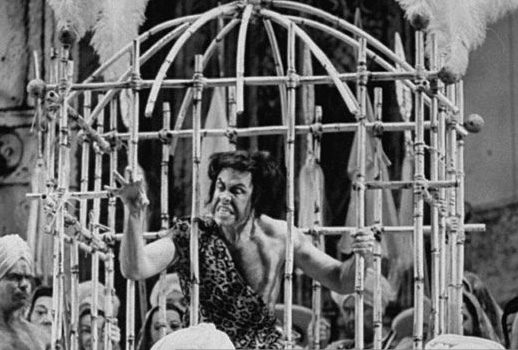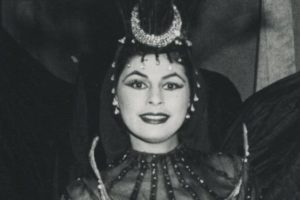

Alan Rich in The New York Herald Tribune:
Gian Carlo Menotti’s ‘The Last Savage” is dislikable for enough reasons to fill this entire edition. It is also likable for that many reasons, plus a few more. The ayes have it.
Just about everything that could possibly be wrong with a modern opera-or one of any period, for that matter-is wrong with Mr. Menotti’s latest effort. The score is embarrassingly derivative, almost shockingly so. The libretto is a silly piece of fluff, and full of cheap cornball gag-writing below the level of a backwoods college varsity show. Both words and music are slick, pretentious, and full of self-conscious chic.
And yet, as produced by the Metropolitan Opera, it adds up to a simply delightful evening of pure light entertainment. A lot of this has to do with the production itself, which is gorgeous beyond dreams. But some of the credit must go to Mr. Menotti and his opera. All the things that are wrong with it just don’t seem to matter. There comes a time when high esthetic principles must be thrown to the winds, and this, dear reader, is the time.
The music whizzes by on wings of the finest gossamer. On its flight it drops names at the rate of about one per phrase. Here a bit of Nicolai’s “Merry Wives”, there an ensemble right out of “Trial by Jury”, now a touch of “Ariadne”…no, wait, it’s “O terra addio.” You need a scorecard just to keep track.
Does it matter? Not at all. Menotti has always been an eclectic, but here he has taken a big forward step. He has crossed the Alps, moved northward, and made the whole continent of Europe his oyster. America too, for that matter; didn’t we hear Sarduia’s Act Three aria in “The Sound of Music”? Of course we did.
But how seductive it all is! Some of the arias are perfectly beautiful; others, notably a patter song for Mr. Scattergood in the second act, are great good fun. There is a long septet for the principals in the first act this is wondrously intricate, and another in the last act that ravishes the ears. There is a zany “Royal Hunt” in the first act that should make Berlioz hide his head, and a wild cocktail party in the second act that makes a sort of synthesis out of the Marschallin’s levee and the “Meistersinger” street fight.
Only a churl could cavil at such treasures, hollow as they may be. And the list doesn’t begin to exhaust the composer’s bag of tricks. Actually, the only place where he seriously oversteps himself is in the publicized mockery of twelve-tone music in the cocktail party sequence. My dear, that kind of dodecaphony went out in the 1920’s; get with it. . . .























Comments